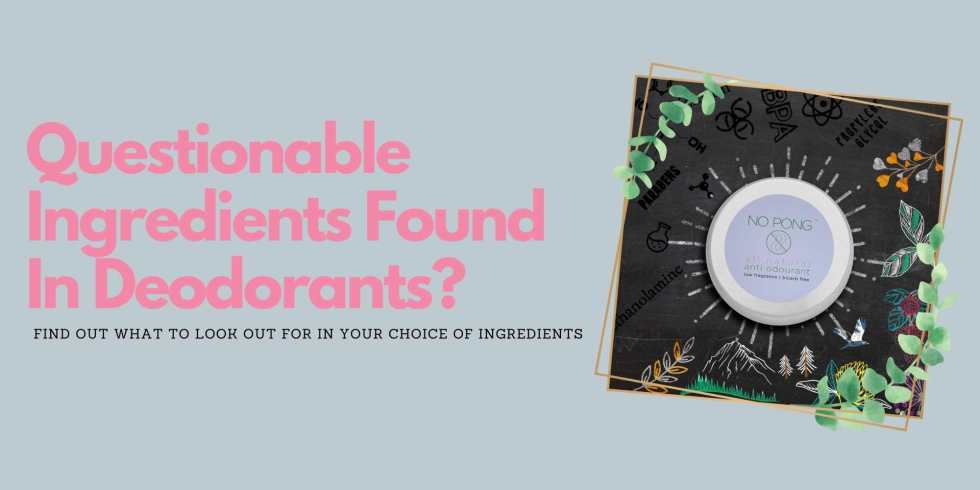
There’s a lot of talk about harmful ingredients in deodorants in many traditional deodorants & antiperspirants.
However, we will start this article by saying that, in our view, the scientific jury is actually out in terms of how harmful some of the more questionable ingredients in traditional deodorant might actually be. After all, they’re used in relatively small concentrations in deodorants and antiperspirants.
That said, why use questionable ingredients at all if you don’t have to!
We believe our armpits are special places, close to our breasts that we should love, care for and protect. What we put there can also be passed on to to infants via breastfeeding.
Here are 9 of the more questionable ingredients found in deodorants and antiperspirants that are on the more questionable scale for armpit care and love:
1) Aluminium chlorohydrate, aluminium zirconium tetrachlorohydrex gly or any aluminium compounds. Aluminium is a metal used in antiperspirants to help block pores and reduce sweat. We don’t really think that’s a natural approach for long-term care of our bodies!
Aluminium can be absorbed through the skin and accumulates in the body. Aluminium has been linked to breast cancer in women and has also been linked to an increased risk of Alzheimer’s disease.
2) Parabens (methyl, ethyl, propyl, benzyl and butyl). There’s little question that this category of ingredients is actually harmful. In fact they’ve been banned in the EU, and restricted in many more.
Parabens have been found to act like the hormone estrogen, and can disrupt our endocrine system the normal function of hormone systems.
They’ve also been found to potentially influence abnormal growth of breast cells, leading to an increased risk of breast cancer.
3) Toluene is toxic if swallowed or inhaled. It is also harmful in contact with the skin. There is some evidence that repeated exposure to toluene may cause reproductive harm.
Perhaps most concerningly, a wide range of research studies since 2000 have shown that various types of parabens behave like estrogen, with the potential to upset hormonal balance. Estrogen is also known to drive the growth of cancerous cells.
4) Triclosan is used as an anti-bacterial ingredient, addressing the reason we smell. However, Triclosan is stored in body fat and is classified as a pesticide by the FDA.
The American Medical Association recommends that triclosan not be used in the home. They may encourage bacterial resistance to antibiotics, allowing resistant strains to flourish.
5) Talc is classified as a carcinogen by the International Agency for Research on Cancer if it contains asbestiform fibers. The quantity of asbestiform fibers in cosmetics is unregulated.
6) Propylene glycol was initially developed as an anti-freeze but is now included in some deodorants and antiperspirants. It is a neurotoxin known to cause contact dermatitis, kidney damage, and liver damage. In propylene glycol’s Material Safety Data Sheet (MSDS), published by the National Institute for Occupational Health and Safety, workers are urged to avoid skin contact with the toxic chemical as it may cause eye and skin irritation, gastrointestinal irritation and discomfort, nausea, headache, vomiting, and central nervous depression.
7) TEA and DEA (triethanolamine and diethanolamine) adjust the pH and are used with many fatty acids to convert acid to salt (stearate), which then becomes the base for a cleanser. They could be toxic if absorbed into the body over a long period, where DEA can cause liver and kidney damage, and TEA can cause allergic reactions. These chemicals are already restricted in Europe due to known carcinogenic (cancer-causing) effects.
8) Silica is a skin irritant. It may be contaminated with crystalline quartz, which is a carcinogen.
9) Steareth (N) – where “n” is any number. It is reacted with ethylene oxide (ethoxylated), a known human carcinogen.
Now you know about some of the more harmful ingredients found in deodorants.
However, fortunately, you now have a perfectly safe and extremely effective alternative in No Pong, so you can throw away questionable ingredients for all-natural ones and smell fresher!
↩️ Back to Knowledge Base
